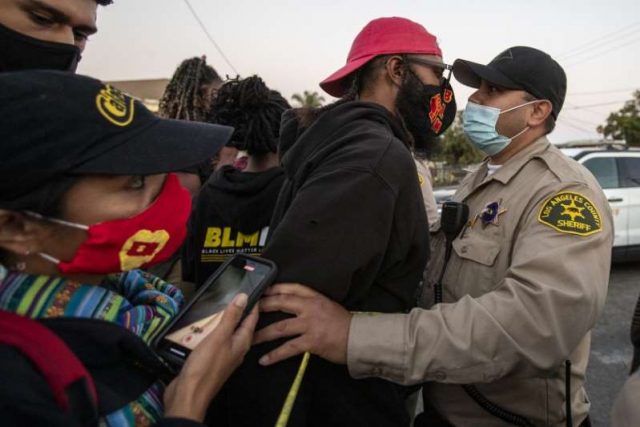
MSN News
Monday’s shooting death of Dijon Kizzee, 29, has elicited fresh waves of outcry and outrage, as well as renewed calls for law enforcement transparency and the demand that those involved be arrested and prosecuted.
“The deputies essentially executed a man riding his bicycle,” Najee Ali, a community activist, said Tuesday while standing beside some of Kizzee’s relatives at the scene of the shooting.
“They’ll say he had a gun, but what they won’t say was that he was not armed with the gun. He did not point the gun. … There was no reason for deputies to shoot a running man.”
Behind Ali, several balloons were tied to memorial candles on the sidewalk, marking the spot where Kizzee died.
The shooting occurred at 3:16 p.m. in the 1200 block of West 109th Place, according to the Sheriff’s Department.
Lt. Brandon Dean said Monday evening that two deputies from the South Los Angeles station were driving on Budlong Avenue when they spotted a man riding his bicycle in violation of vehicle codes — though Dean said he didn’t know what specific codes the man allegedly broke.
Deputies attempted to contact the man, but he dropped the bicycle and ran north on Budlong for one block with deputies in pursuit, Dean said. Deputies again tried to make contact with the man in the 1200 block of West 109th Place, and Dean said he punched one of them in the face.
The man then dropped a bundle of clothing he had been carrying, Dean said. The deputies spotted a black handgun in the bundle, and both opened fire, killing the man.
Dean said he did not know how many times the man — later identified by coroner’s officials as Kizzee — was shot. Sheriff’s officials said a handgun was recovered at the scene.
Ali said that Kizzee was shot in the head and that his family would conduct an independent autopsy.
Family members said that Kizzee, an unemployed plumber who lived in Lancaster, had come to the area to visit friends.
Fletcher Fair, Kizzee’s aunt, said she was tired of seeing police violence against Black people.
“Right now, I’m sad and I’m mad at the same time,” she said. “Why us? … We are tired. We are absolutely tired.”
Anthony Johnson, Kizzee’s uncle, said he and residents of the neighborhood where his nephew was shot spent time Tuesday morning cleaning his blood off the sidewalk.
He pointed to plastic gloves lying on the pavement, which he said had been left there by law enforcement.
“They shot him. They killed him The least they could have done was clean up after themselves,” he said.
He described Kizzee as someone who was “the life of the party” and said he last saw his nephew about a week ago in Palmdale.
“We kind of had a head bump, and I said, ‘I love you,’ and he said, ‘I love you back,’ and I told him to stay safe,” he said.
Kizzee did not have children and is survived by his younger brother, who just graduated from high school, his family said.
The shooting has prompted renewed calls for L.A. County sheriff’s deputies to wear body cameras.
Standing in front of a Black Lives Matter mural in Jefferson Park, Earl Ofari Hutchinson, president of the Los Angeles Urban Policy Roundtable, asked why the department had yet to equip its deputies with such equipment.
“All we have to go on this latest shooting is one thing: their version of it,” he said Tuesday. “We’re in the dark. We don’t know anything.”
Hutchinson said he and other civil rights leaders planned to attend Tuesday’s meeting of the Los Angeles County Board of Supervisors to request funding to pay for the equipment.
“It must be now, and it must be mandatory,” he said.
The department, he added, has no excuse for the lack of body cameras because officials have had years to figure out what equipment to use and a funding source.
The Los Angeles Police Department, for instance, began deploying body cameras in 2015.
“Why does the LAPD have body cameras and not the Sheriff’s Department?” Hutchinson said. “When there’s a shooting, law enforcement says one thing, and if we have no way to really verify, then what do we have? We have a lot of questions. You have a lot of controversy, and you have something else too — a community that’s outraged.”
The shooting of Kizzee comes less than three months after another controversial fatal shooting by sheriff’s deputies. The death of 18-year-old Andres Guardado in Gardena sparked weeks of demonstrations.
Protesters took to the streets again Monday, initially gathering in Westmont where Kizzee was shot. There were chants of “Say his name,” “No justice, no peace” and “Black lives matter.” Some said they didn’t think the shooting was justified.
Later in the night, more than 100 people marched to the sheriff’s station on Imperial Highway, where demonstrations continued.




